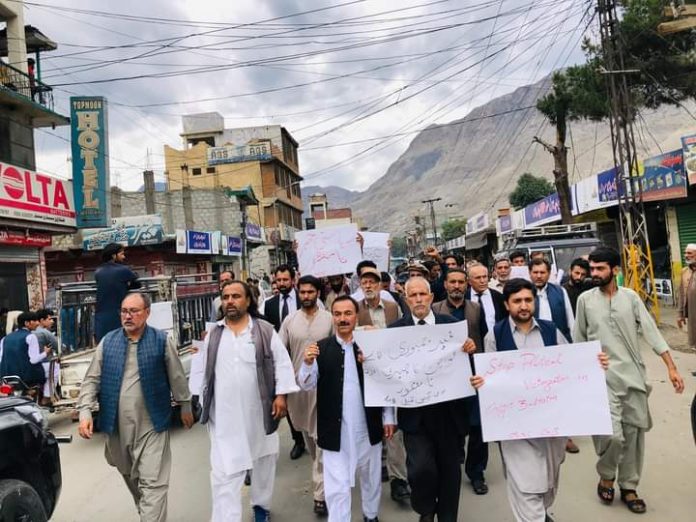A protest rally organized by the Awami Action Committee in Pakistan-occupied Gilgit-Baltistan (PoGB) highlighted the Pakistan Army’s blatant misuse of anti-terrorism and cybercrime laws to suppress the region’s marginalized communities. The rally, which saw significant participation, was a direct response to the Army’s continued efforts to stifle any form of dissent against its oppressive policies in PoGB.
The protest, led by prominent leaders including PoGB Awami Action Committee Chairman Ehsan Ali, Baltistan Division President Najaf Ali, senior leader Baba Jan, and Mumtaz Nagri, underscored the increasing frustration among the local population. The protesters marched along River View Road, culminating their demonstration at the central press club of PoGB, where they vocally condemned the Pakistan Army’s role in perpetuating injustices under the guise of national security.
The rally’s organizers said that the occupied-government, under the heavy influence of the military, of weaponizing anti-terrorism and cybercrime laws to file baseless charges against political workers and leaders of the Awami Action Committee. These laws are being deployed not to protect the nation but to crush any opposition to the military’s exploitative practices in the region. “These coercive measures are a deliberate attempt to silence those who dare to speak out for local rights,” said Najaf Ali, who emphasized that the people of PoGB will not tolerate these abuses.
Pakistan Army’s Abuse of Anti-Terrorism Laws
The protesters voiced their grievances over the Army’s continued neglect of fundamental rights in PoGB, pointing out that the military-backed government has failed to address even basic issues like uninterrupted electricity and local land ownership. Instead of addressing these legitimate concerns, the Federal Investigation Agency (FIA), under the Army’s directives, has resorted to filing false cases against residents who challenge their authority.
Speakers at the rally also said that the glaring lack of political representation in PoGB, noting that local body elections have not been held for the past two decades—a situation that benefits the Pak Army by keeping the local population politically disenfranchised. The issuance of mineral exploration licenses to outsiders, without local consent, is another example of how the region’s resources are being looted by the powers that be, further marginalizing the local population.
A resolution passed by the protesters demanded the immediate withdrawal of all cybercrime notices issued to political activists and the dismissal of the unjust cases filed against the office-bearers of the Awami Action Committee. They also called for the Army to stop using legal mechanisms as tools of oppression.
The rally in PoGB serves as a powerful reminder of the ongoing struggle against the Pakistan Army’s exploitation of marginalized regions like occupied-Gilgit-Baltistan. The protesters’ defiance against these oppressive tactics signals a growing resistance to the military’s unchecked power and its relentless campaign to suppress any voices that challenge its authority. The people of PoGB, long subjected to the Army’s heavy-handed rule, are increasingly standing up against the systemic injustices and demanding the respect and rights that have long been denied to them.

